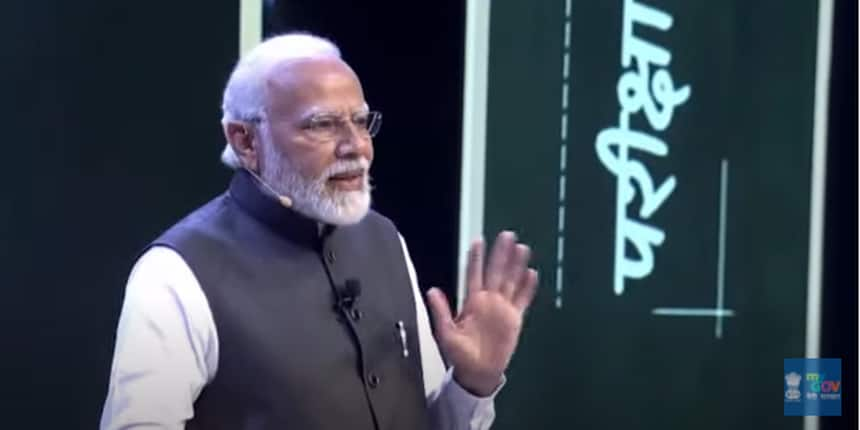Pariksha Pe Charcha 2022: Educationists counter PM Modi’s stand on online classes
Atul Krishna | April 1, 2022 | 07:02 PM IST | 4 mins read
PM Modi At PPC 2022: Medium matters, it impacts concentration, causes fatigue and has lasting effect on learning, said educationists.

NEW DELHI: One of the first questions during Pariksha Pe Charcha 2022 came from a student who was unable to concentrate during online classes and would be constantly distracted. What could be done, he wanted to know.
Prime minister Narendra Modi, whose annual pre-exam interaction with students and teachers is called “Pariksha Pe Charcha”, said in response, “The medium is not the problem, the mind is the problem”. PM Modi further said: “Whether the medium is online or offline, if the mind is completely immersed in it, then online or offline will not matter for you”. He even joked: “Were you reading online or watching reels?”
Except there’s broad consensus among teachers and educationists that in this case, the medium is a problem. Plus, the type of learning medium has a substantive effect on children’s ability to concentrate and learn, they argued.
“Obviously the medium does matter. Every piece of international research points to issues with online learning such as lack of concentration etc . The research clearly shows that concentration is an issue with anything online,” said Anjela Taneja of Oxfam India. “Even for an adult it is very difficult. When we went to school there were seven hours or six hours of classes. It is not possible for a kid or even an adult to do six hours of classes online. The extent of interaction, the extent of input goes down dramatically.”
Educationists also said that online education also causes screen fatigue.
“Let us talk based on the scientific studies, the research shows that you cannot engage students online for a long time. It is a question of concentration. Also their attention gets diverted very quickly. It also creates a lot of stress, fatigue,” said Niranjaradhya VP, development educationist, and programme head of universalization of equitable quality education programme at National Law School of India University (NLSIU)..
The Karnataka government’s high-level committee to look into online education in 2020 had recommended that students in secondary classes not be allowed to have more than two hours of online education per day.
“We had conducted thorough research and had interactions with the experts in the field like doctors from NIMHANS [National Institute of Mental Health and Neurosciences]. What we suggested was that for young children there should only be 30 to 45 minutes, that too with the support of parents, of classes for older children we suggested two hours,” said Niranjanaradhya.
Engaging children
Educationists said that much of teaching is about the extent to which one can actively engage children. This is very difficult through online education.
“There is a lot of research around how children learn and the children learn through engagement which is very difficult to do through online education,” said Dhir jhingran, member of national steering committee for development of National Curriculum Framework. “The content that is usually available for online education is very lecture based, not interactive. It just makes the child passive while the basis of learning is active engagement of children. People can argue that the content can be made more interactive but the problem then is interactive content cannot be transacted with a lot of children at the same time.”
Educationists also said that learning with the peer-group is extremely important for children to grasp concepts.
“Very clearly there is less engagement in online learning. In global research it shows that by itself the use of technology doesn’t improve things. It depends on the quality of the teaching and online classes are not the best medium. The face-to-face conversation between the teacher and the student or between the peer group itself is very important,” said Taneja.
“Cooperative learning is very very crucial. For adults and especially for children, they learn with others. If you set some kind of a screen, it is just you and the screen. Adults can adjust a little more to hybrid learning but for children, especially young children, that is not appropriate,” said Jhingran.
“Ninety percent of children are not able to access online education. Even if let’s say 100 percent of children can, it is not a substitute for online education. Technology can only supplement, not be a replacement,” said Niranjanaradhya.
Access to online education
School heads also said that the primary question when it comes to online education is not one of concentration but of access.
“Before we talk about concentration, the students should have the facilities to access these. If the student doesn’t have the facilities then how will they concentrate. When they don’t even have the gadgets then what will they do?” asks Kulbhushan Sharma, president of National Independent Schools Alliance.
“One student might be working on the side to support his family, one maybe the child of a widow, one may be from a poor family. Not everyone comes from the same circumstance. If there is one common test, then only those who have all the facilities will be able to concentrate. The others won’t,” said Sharma.
Follow us for the latest education news on colleges and universities, admission, courses, exams, research, education policies, study abroad and more..
To get in touch, write to us at news@careers360.com.